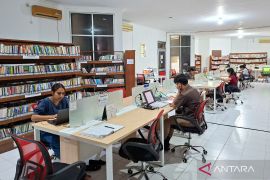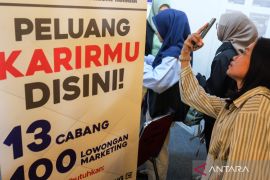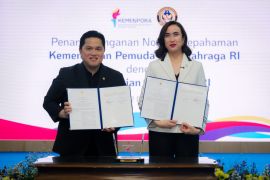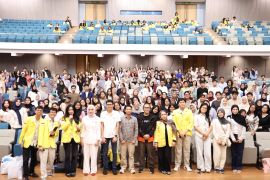The peak of the demographic bonus is estimated to occur in 2030.
Based on data from Statistics Indonesia (BPS), as of 2020, the population of people in the productive age group reaches 140 million out of a total of 270.20 million people in Indonesia.
Indonesia's population is forecast to reach 318.96 million in 2045, with 207.99 million people in the productive age group, he noted.
Related news: Young generation must become agent of change: MPR
Moreover, the population in the unproductive age group is estimated to reach 110.97 million, comprising 44.99 million people of the unproductive age and 65.98 million people in the age group of 0-14 years.
Based on this data, it can be forecast from now on that in 2045, an estimated 100 people of the productive age will bear the burden of 54 people of the unproductive age.
Indonesia's young generation must prepare to become the agents of change to support national development, so that the demographic bonus does not become a national disaster, deputy chairman of the People's Consultative Assembly, Ahmad Basarah, stated.
Everyone should be aware of the demographic bonus that Indonesia is expected to reach in 2045, or exactly 100 years of its independence.
To avoid a national disaster in the next quarter century, the current young generation should be directed to be actively involved in national development, Basarah affirmed.
Related news: Youth must become change makers: East Java Governor
The nature of national development is not only physical but also mental and spiritual and includes the obligation to uphold the state ideology that unites the nation.
He opined that if the younger generation is not prepared to become the agents of national development from now, the demographic bonus could become a national disaster when Indonesia celebrates its 100 years of independence.
Hence, he urged everyone to properly manage the demographic bonus that Indonesia is currently experiencing, so that it becomes a blessing rather than a disaster.
In the past, Indonesia's independence actually resulted from the great energy of the youth at that time; Bung Karno, Bung Hatta, and the martyrs of other nations were the youth of their time when the youth oath was proclaimed and when Indonesia's independence was proclaimed, he said.
Related news: Youth living in islands must not feel inferior: governor
Young entrepreneurs
Cooperatives and Small and Medium Enterprises Minister (MenkopUKM), Teten Masduki, is targeting to raise the proportion of young entrepreneurs, from 3.18 percent to 3.95 percent by 2024 to prepare Indonesia to become a developed nation.
There needs to be a change in the mindset, especially regarding the creation of young entrepreneurs that must involve universities and the private sector.
This requires a new approach. Not with a bureaucratic approach. To prepare these new entrepreneurs, we have to work together with campus incubators and private incubators, he said.
An incubator is a platform that accommodates and supports startups and new entrepreneurs in developing business models and connects them to investors.
Masduki said that currently, large campuses have their own business incubators, so the Ministry of Cooperatives and SMEs is seeking to help other universities to participate in forming business incubators.
He further said that to realize the target, Indonesia will need to produce approximately one million young entrepreneurs within two years.
The minimum for developed countries is four percent. The average developed country now is between 10 and 12 percent. We are still lagging behind Singapore, which is currently 8.6 percent, while Thailand and Malaysia are already above 4.5 percent, the minister said.
Hence, he expressed hope that the signing of a memorandum of understanding (MoU) on cooperation by the Ministry of Cooperatives and SMEs and Warmadewa University in Denpasar, on Tuesday, can be considered a stepping stone for campuses to direct students to become entrepreneurs instead of finding private or government employment.
We really have to change the mindset of universities; we can no longer prepare graduates to become employees. We change how students are not job seekers, but job creators, the minister said.
Related news: Need to consistently uphold Youth Pledge spirit: MPR
Three keys
Head of the National Population and Family Planning Agency (BKKBN) Hasto Wardoyo highlighted three main keys for Indonesia to succeed in reaping the demographic bonus for a healthy and prosperous future.
Stunting is a serious threat to the demographic bonus that Indonesia is currently facing. Do not let our opportunity, the demographic bonus, fail to be used properly, Wardoyo noted.
The BKKBN head explained that the demographic bonus is a condition wherein the number of people from the productive population exceeds that of the unproductive one. This condition could affect the improvement in welfare of the country.
Secondly, the use of contraceptives after birth also plays a major role in producing healthy children. Through contraception, families can plan birth spacing for their children, he stated.
This stunting is purely due to mismanagement because of sub-optimal nutrition, sub-optimal health in the first one thousand days of life, and the parents' lack of information in raising kids. Stunting is not genetic, Wardoyo emphasized.
The third key was related to knowledge on reproductive health. A gap in the parents' knowledge regarding reproductive health could create a different mindset, specifically marriage at a young age, school dropout, young-age pregnancy, and multiple pregnancies without family planning.
Reproductive knowledge can help transform a productive demographic bonus into a welfare bonus, specifically by increasing the per capita income, reducing maternal and infant mortality, and lowering unemployment.
By focusing on these three keys, Indonesia will be able to reap a demographic bonus that is productive, healthy, and able to create jobs when the country is moving toward an aging population while preventing a missed demographic dividend or the condition in which the number of people in the elderly population increases but not being productive, sick, and relatively poor.
Related news: Youth Pledge Day a reminder to promote creativity, economy: VP
Related news: Minister urges youth to develop nation's potential
Editor: Fardah Assegaf
Copyright © ANTARA 2022












